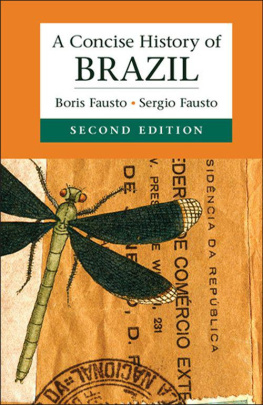
Brazil on the Move by John Dos Passos
Historical Narratives
The Ground We Stand On
The Head and Heart of Thomas Jefferson
The Men Who Made the Nation
Mr. Wilsons War
Contemporary Chronicles
Chosen Country
Three Soldiers
Manhattan Transfer
The 42nd Parallel
Nineteen Nineteen
The Big Money
The Most Likely to Succeed
Adventures of a Young Man
Number One
The Grand Design
The Great Days
Midcentury
Brazil on the Move
I
MELTING POT OF THE AMERICAS
The Brazilians are great people for telling stories on themselves. One story that was going the rounds a few years ago was about God and an archangel on the third day of creation. When the Lord Jehovah has finished making Brazil he cant help bragging a little to one of the archangels. Hes planted the greatest forests and laid out the worlds biggest river system and built a magnificent range of mountains with lovely bays and ocean beaches. Hes filled the hills with topaz and aquamarine and sowed the rivers with gold dust and diamonds. Hes arranged a climate free from hurricanes and earthquakes which will grow every conceivable kind of fruit.
Is it fair, Lord, asks the archangel, to give so many benefits to just one country?
You wait, says the Lord Jehovah, till you see the people Im going to put there.
The real point of this story is, of course, that its topsyturvy. Ever since the Portuguese founded their first colonies there in the early fifteen hundreds the development of Brazil has been held back by its inconvenient geography. The rivers run the wrong way. The mountains are in the wrong places. The steep coastal range for centuries formed a barrier to penetration of the interior. Though the central and southern uplands are suitable for colonization the rain forests of the Amazon basin in the north offer the sort of climate and terrain that no civilization has yet been able to cope with. The eastern bulge is cursed with perennial droughts. Until the coming of air transportation, which a Brazilian named Santos-Dumont, by the way, did almost as much as the Wright brothers to promote, it literally took months to get from one part of the country to the other. Tropical diseases are still a threat to development. The chief asset of Brazil is the Brazilians.
How did a handful of settlers from tiny Portugal, a country which during the great period of Portuguese colonization numbered at most a couple of million souls, manage to occupy and assimilate one half of the South American continent? How is it that the Brazilians, of all the South American peoples, seem furthest on the way towards producing a civilization of their own?
It is only recently that we have begun to recognize that there is something a little special about the colonial society the Portuguese established in America and Africa and the Orient. Corrupt and inefficient was what we were taught about it in school. The Portuguese have had, and continue to have, a bad press.
Perhaps the thread of racial and religious and political tolerance that keeps reappearing in their history has something to do with the success of the Portuguese as colonizers. To begin with Portugal was made up of more various cultural strains than the other colonizing nations of Europe.
The northern Portuguese had a lot of Celt in them. Many of the landowning families were the offspring of blueeyed Visigoths. There was a strong infusion of Burgundian French during the period of the establishment of the monarchy. In the south there was Arab and Berber blood. There, the peasantry, though Christian in religion, retained habits and customs acquired during three centuries of subjection to the Moors. The towns had a large Jewish population, possibly descended as much from Phoenician and Carthaginian colonists whose language and culture were Hebraic, as from the Israelites proper. During Portugals formative years, each of these populations intermarried fairly freely with the rest.
The Spanish philosopher Miguel de Unamuno used to tell an amusing story to illustrate the prevalence of Semitic blood among the Portuguese. When the great King Manoel of Portugal wanted to marry a Spanish princess he was told that he must first purge his kingdom of Jews. He consented, but according to Don Miguel, the chief minister who brought the King the expulsion decree to sign, is supposed to have asked: Which of us shall leave first, sire, you or me?
Seafaring peoples tend to get their prejudices rubbed off. Farmland was scarce on the steep Portuguese coast. Its people were forced to find their livelihood in trading and fishing. Their wine trade with England ripened early into a political and commercial alliance which added one more element to their cosmopolitan outlook. Prince Henry the Navigator was a grandson of John of Gaunt. Then, after Vasco da Gamas rounding of the Cape of Good Hope, African slaves, and all the arts and complexities of India and China and Japan started pouring into Lisbon. Portuguese culture flared up into the sudden brilliance of the poetry of Cames and the surrealist style of the Manueline architects and stonecarvers.
It was at this explosive moment in the year 1500 that Pedro Alvares Cabral, in sailing a westerly course on his passage to India to avoid the calms off Africa that had so baffled Vasco da Gama, found himself, quite by accident, in Brazil.
A certain amount of mystery still hangs over the early exploration of the American coast. It is likely that even before Columbuss four expeditions opened up the New World to the Spaniards, Portuguese ships had been fetching the red dyewood called brazilwood from the beaches of the eastern bulge of South America. Brazil appeared on early maps as an Atlantic island.
When Cabrals little fleet sailed into Prto Seguro he seems to have taken it for granted that it was this island he was landing on. He celebrated Mass; announced to the Indians lurking about that he was taking possession in the name of Dom Manoel the First, King of Portugal and Lord of the Conquest, Navigation and Commerce of India, Ethiopia, and Persia; and sailed away to round the Cape of Good Hope in search of the profitable cargoes of spices he was hoping for in the Orient.
For a couple of centuries the authorities in Lisbon considered the settlements which grew up along the Brazilian coast, through the efforts of Jesuit missionaries and of private adventurers, as mere waystations to the East. Left to their own devices, marrying into Indian tribes for lack of Portuguese women, the colonists began to think of themselves as Brazilians.
In the north they raised sugar, and as the Indians were nomadic woodland hunters who couldnt adapt to agriculture, they imported slaves from Africa to plant and cut the cane.
In the backlands they raised cattle. As the population increased the need for fresh pastures and the perennial quest for gold drove the ranchers of the So Paulo plateau to scour the hinterland. Fighting or absorbing the Indians as they moved, they formed themselves into wandering bands that explored the country south to the La Plata estuary and west through the central uplands into the furthest confines of Mato Grosso. Bandeirantes, flagcarriers they called themselves.
When the Brazilians began to ship home gold and diamonds, the Portuguese kings woke up to the fact that Brazil was a valuable possession. Their oriental empire was falling to pieces. During the eighteenth century it was gold and precious stones from Brazil that supported the court at Lisbon.
The home government did little in return, except to try to keep the Brazilians in their place. After the expulsion of the Jesuits, schools and colleges were discouraged. Printing presses were forbidden, and so was any industry which might compete with the home country. Although British shipmasters already had a share in the Brazilian trade, it all had to be channeled through Lisbon.
Next page














